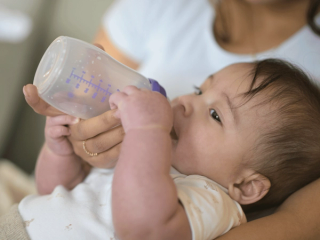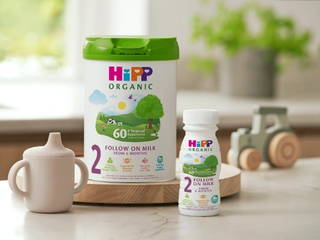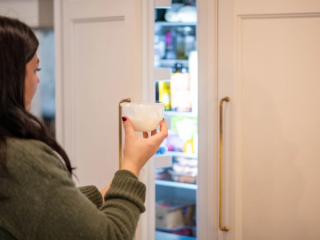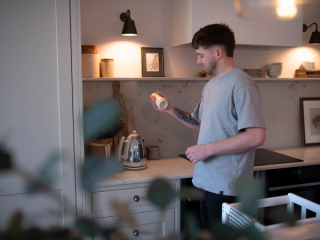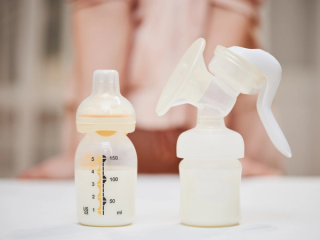
- Home
- Advice Hub
- Baby
- Baby Feeding
- Cluster Feeding
Cluster Feeding: What is it? Why Does It Happen? How Can I Help?
Learn what cluster feeding is, why it happens, and how to manage it. Tips for breastfeeding and formula-feeding parents during baby growth spurts.
What is Cluster Feeding?
Why Do Babies Cluster Feed?
When Do Newborns Cluster Feed?
How Long Do Babies Cluster Feed?
Do Formula Fed Babies Cluster Feed?
Is My Baby Cluster Feeding?
How Do You Stop Cluster Feeding?
How can I make Cluster Feeding Easier?
When Should I Speak To A Healthcare Professional?
At times, it may feel as though your baby wants to feed constantly. If your baby seems to have an endless appetite and the intervals between feeds are very short, they are likely cluster feeding. This is a normal phase where babies feed more frequently over a short period, often in the evenings.
This article will answer all the most common questions about cluster feeding. While it can be exhausting, cluster feeding is temporary and helps to establish your baby’s feeding patterns and milk supply.
What is Cluster Feeding?
Cluster feeding is when a baby suddenly feeds much more frequently than usual for a period of time. The feeds tend to come in clusters and it can last for a couple of hours at a time.
Although cluster feeding can be tiring for parents, it is normal developmental behaviour for a young baby. It typically happens in the first few weeks or months of your baby’s life.
Unfortunately, some new mums misinterpret cluster feeding and think that it is a signal that their body isn’t producing enough milk or that their breastmilk isn’t able to satisfy their baby. However, this isn’t the case and cluster feeding doesn’t indicate there is a problem. If your baby is gaining weight and having plenty of wet and dirty nappies there is no need to worry.
It can, however, help boost your milk production, as the more often your baby feeds, the more breastmilk your body will make to keep up with their appetite.
Why Do Babies Cluster Feed?
Cluster feeding is most often linked to growth spurts or developmental milestones when their bodies are signalling that they need extra nourishment. However, there can be other causes of cluster feeding such as sleep changes, being unwell, or missing a feed such as on a day where your baby might have slept much more than is typical.
When Do Newborns Cluster Feed?
Many new mums ask, “When does cluster feeding start?” and it’s often sooner than you’d expect. Cluster feeding can happen from when your baby is just a few days or weeks old and they seem to want to feed either constantly or very often. Cluster feeding happens most in the first four months.
How Long Do Babies Cluster Feed?
A cluster feeding phase usually lasts a few days, and these short phases can occur throughout the first four months of life, and sometimes a little later on too. The actual feeding times might feel like a lot - with your baby feeding on and off for up to 3 or 4 hours at a time.
Do Formula Fed Babies Cluster Feed?
Formula fed babies cluster feed less than breastfed babies, but it does still occur, especially during growth spurts or developmental leaps. If your baby is feeding much more than that and some of the feeds are very close together, this could be cluster feeding. Cluster feeding formula feed is more difficult as it can be difficult to know how much more milk to make up. Respond when your baby is indicating hunger cues that they are still hungry and offer more milk. Cluster feeding with a bottle can lead to overfeeding your baby, it’s important to use your baby’s cues to guide you when to stop.
Is My Baby Cluster Feeding?
It can be tricky to spot if your baby is cluster feeding, especially if they are not in a regular routine. All newborn babies will need to be bottle or breastfed regularly and will usually feed up to 12 times in a 24-hour period.
However, if your baby is feeding much more than that and some of the feeds are very close together, this could be cluster feeding. Cluster feeding is likely if your baby is just a few days or weeks old and they seem to want to feed either constantly or very often.
Your baby will be showing all their usual hunger cues and will not settle until they are fed. Cluster feeding is much more common in breastfed babies than those who are formula fed.
Your baby may spend much longer at the breast before pulling off or they may do the opposite and seem to feed for short periods, almost like having a snack, before showing signs of hunger again very quickly.
Babies who are cluster feeding will be content and settled while nursing and have regular wet and dirty nappies. Once your baby is four days old, they should be producing at least six wet nappies a day. If your baby is very fussy on the breast and seems unsatisfied even when they finish nursing, this could be a sign that there is another problem.
Cluster feeding will often take place in the evening. Some people believe this is because the baby is stocking up on milk, ready for a longer stretch of sleep at night.
Older babies will sometimes cluster feed when they are going through a growth spurt or developmental leap or when they are teething. You may notice that they feed a lot more than usual for several days in a row before slipping back into a similar routine to before.
Sometimes people think fussy babies are cluster feeding when actually they have colic and cry for long periods at a time without settling. However, if your baby has colic then they will not calm or settle after a feed and will remain fussy even while nursing.
How Do You Stop Cluster Feeding?
We shouldn't try to ‘stop’ cluster feeding from happening, as it is a normal behaviour in babies. However, it can be managed by ensuring your baby gets enough milk at each feed, maintaining a good latch if you are breastfeeding, and adjusting your routine to accommodate your baby’s feeding preferences, which is often during the evenings. Remember that cluster feeding can be beneficial for your baby’s growth and is usually a short term thing.
How can I make Cluster Feeding Easier?
Cluster feeding can be heavy going for both mum and baby. For a start, feeding so regularly is exhausting and can lead to you feeling emotionally drained and overwhelmed.
Physically it can take a toll too, and you may find your nipples become sore from frequent breastfeeding. You may also feel run down, especially if you are not able to eat and drink regularly and you’re getting very little sleep.
It is really important to stay hydrated when you are breastfeeding so make sure you have a water bottle handy at all times to replace the fluids you are producing. Remember that while this may feel like a bump in your breastfeeding journey, cluster feeding is a normal part of breastfeeding and will not last forever.
Make sure you have plenty of handy snacks near where you breastfeed so you can keep your energy levels up during cluster feeding. You will also feel better if you have something to keep you entertained, whether it is listening to a podcast or audiobook, watching television or even phoning a loved one. Try to change breastfeeding positions every so often to avoid your nipples becoming sore and use a lanolin-based product to soothe and protect them.
If you have a partner or family member who is able to help with the baby, ask them to take the baby as much as possible when you are not feeding so you can take a break and a chance to unwind. Forget about any tasks which are not urgent, most things will be able to wait until this period of cluster feeding passes.
If you have an older child, cluster feeding can be particularly challenging, as it can feel like you are spending all your time with the baby. Putting together a box or basket of special toys which your older child can only play with while you’re breastfeeding can help keep them entertained.
It is also a good idea to breastfeed somewhere where you can spend some quality time with your older children as well. Take the opportunity to talk to them about their day or watch their favourite TV programme with them.
Adjusting your routine when your baby is in a cluster feeding phase can be helpful. For example, not making plans in the evening so that you can take the pressure off expectations for being social. Cluster feeding is often a phase, so postponing plans and trying to relax can be helpful.
When Should I Speak To A Healthcare Professional?
If you are concerned about your baby’s feeding, don’t worry alone. Seek support from your local breastfeeding support team, your health visitor, your GP or a lactation consultant.
They will be able to offer practical advice and support and also check that there aren’t any problems that could be making your breastfeeding journey more challenging. There are also a number of breastfeeding helplines you can call for support.
Important Notice
We recognise that breastfeeding is best, providing many benefits to both mothers and infants. We also recognise that every parenting journey is unique, and we are here to support you through this journey, however you choose to feed your baby.
If you choose to breastfeed it is important that you eat a healthy well-balanced diet in preparation for and during breastfeeding. Before deciding to combination or formula feed your baby, note that reducing or stopping breastfeeding can be difficult to reverse. Babies feed on demand, so replacing breastfeeding with infant formula milk may reduce your supply. Formula feeding has both social and financial implications. Talk to your midwife or health visitor for guidance and support.
If you choose to use formula milk, make sure you choose the right milk for your baby’s age and prepare and store it according to the instructions on the packaging. Not doing so may make your baby ill. Infant formula is a nutritionally complete breastmilk substitute that can be used from birth. From 6 months you can choose to use follow on milk as part of a mixed diet and from 12 months you have the option to move onto growing up milk alongside a balanced diet.


